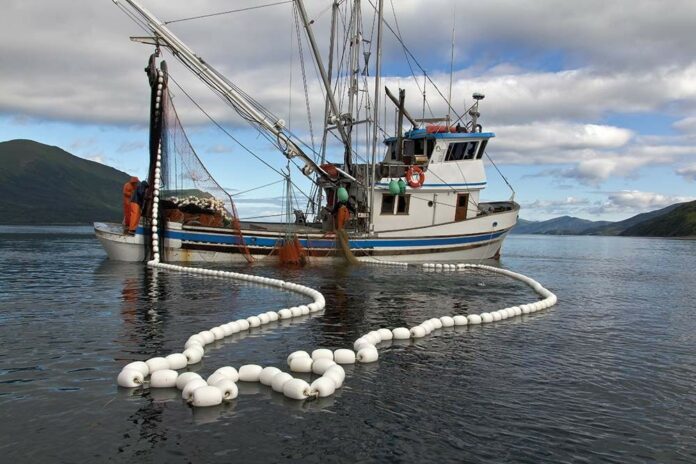Bob Dooley has been fishing since he was 11, having spent most of that span as a boat owner, often traveling up the West Coast to the waters off Alaska, searching for pollock and other whitefish.
Now 65 and retired, Dooley serves on the Pacific Fishery Management Council, weighing in on regulatory policy. The Half Moon Bay fisherman realizes the term “fishery management” has at times been cast as a bad word among fishermen, especially those from the generation prior, but Dooley credits the federal regulations with keeping the nation’s fisheries sustainable and letting populations rebound—ultimately giving fishermen like himself a shot at a career.
The backbone of this whole framework is the 1976 Magnuson-Stevens Fishery Conservation and Management Act. Among its provisions, it outlined a system to create fish allotments for individual fisheries. Congress has reauthorized the act a few times over the years, most recently in 2006. In the years since, efforts to revisit the law have stalled out before netting any results. Now, U.S. Rep. Jared Huffman (D, San Rafael) is starting a “listening tour” to get perspectives on how to improve Magnuson–Stevens. Huffman plans to introduce a bill to tackle the reauthorization within the next year.
Looking ahead, Dooley says Congress may take this important opportunity to clarify wording that often gets misinterpreted. By and large, though, he’s hoping that legislators hold interest groups at bay.
“The problem is when you open the door, a lot of special interests can climb through. It’s a good act, and I don’t think we need to fool with it much,” he says.
As the recently elevated chair of Congress’ Democrat-controlled Water, Oceans and Wildlife Subcommittee, Huffman says his goal is to help manage oceans and fisheries “to be as environmentally and economically resilient as possible.” He’s asking how issues like global climate change should be considered in a revised version of the act.
Noah Oppenheim, executive director of the Pacific Coast Federation of Fishermen’s Associations, is looking forward to the listening tour. Oppenheim has his doubts about how Congress can make any legislative progress on global warming under a White House that denies the existence of climate change. Nonetheless, he believes the opportunity will prompt fishermen to start thinking more globally and get involved outside of the individual policies undertaken by local fishery councils.
Representative Huffman, for his part, enjoys support from an environmental community that’s aligned with his values. Huffman riding herd over the process, Oppenheim says, “will be an interesting dynamic to watch.”
“He needs to understand,” he says, “that fisheries management is about the industry first,” and that the Magnuson-Stevens Act wasn’t intended to shut down the industry, but to figure out how to make it work in a manner that’s sustainable for fish and fishermen alike.
Oppenheim knows full well that fishing has an impact on fish stocks.
“We’ve brought back many stocks from the brink,” he says. He adds that California fishermen have, if grudgingly, “throttled back their activities to protect them.” Overfishing is one issue, but it’s “climate impacts and industrial activities outside of fishing,” he says, “that are the biggest impact” on fish stocks.
Oppenheim explains that lawmakers should take a hard look at any offshore industry development as they study reauthorization. He says external threats to fishermen’s livelihoods—offshore oil and gas rigs and wind farms—should be a part of the discussion. Concerned about the impacts of a proposed wind farm south of the Monterey Bay Sanctuary National Marine Sanctuary, Oppenheim notes that the current law doesn’t allow for any regulation of industries that might have a deleterious impact on fishermen’s livelihoods. The Bureau of Energy Management oversees the leasing for such projects.
With Huffman still testing the winds on this topic, it’s unclear which direction policy discussions might take.
Tobias Aguirre, CEO of the nonprofit advocacy group Fishwise, believes Congress should strengthen the act’s environmental aim to let fisheries continue rebounding. “We need to keep our foot on the gas,” says Aguirre. Fishwise has been collaborating on the international Seafood Alliance for Legality and Traceability, which aims to improve transparency in global seafood markets. Fishwise’s next mission, he says, will be improving the working conditions of fishermen.
The livelihoods of fishermen is certainly a chief concern of Oppenheim.
A fisherman himself, he’s the first to admit that fishermen have occasionally been part of an “anti-science” agenda when it has suited them, but he also says they provide valuable data to scientists and regulators. “Fishermen can both be far better observers of ocean conditions and the real-time status of fisheries,” he says, “and simultaneously be in denial over the impacts that broad-scale fishing can have over time.”
But it’s also true that the science isn’t always right, he adds. Scientists have missed the mark when it comes to fish stocks—surveys have been wrong. The bottom line for Oppenheim when it comes to fisheries management is that “we’re doing better than we ever have in the past,” though there’s much to be done. He believes the “ship can be righted to some extent by bringing in the fishermen,” especially small-scale operators. “One of the more interesting things to note about fish politics is to notice how ‘flipped’ it is,” he says. “The quote-unquote ‘liberal’ politics of egalitarianism and support for communities” has not been the traditional Democrat approach, he argues.
At the same time, conservative lawmakers pegged with being too pro-business at the expense of the environment, he says, have in fact led the charge to focus on localities and small-time operators.
“Fundamentally, liberals should be about supporting communities,” Oppenheim says as he pines for a post-partisan fisheries management debate. “Partisanship in fisheries is terrible, counterproductive and we’ve been seeing too much of it lately.”









